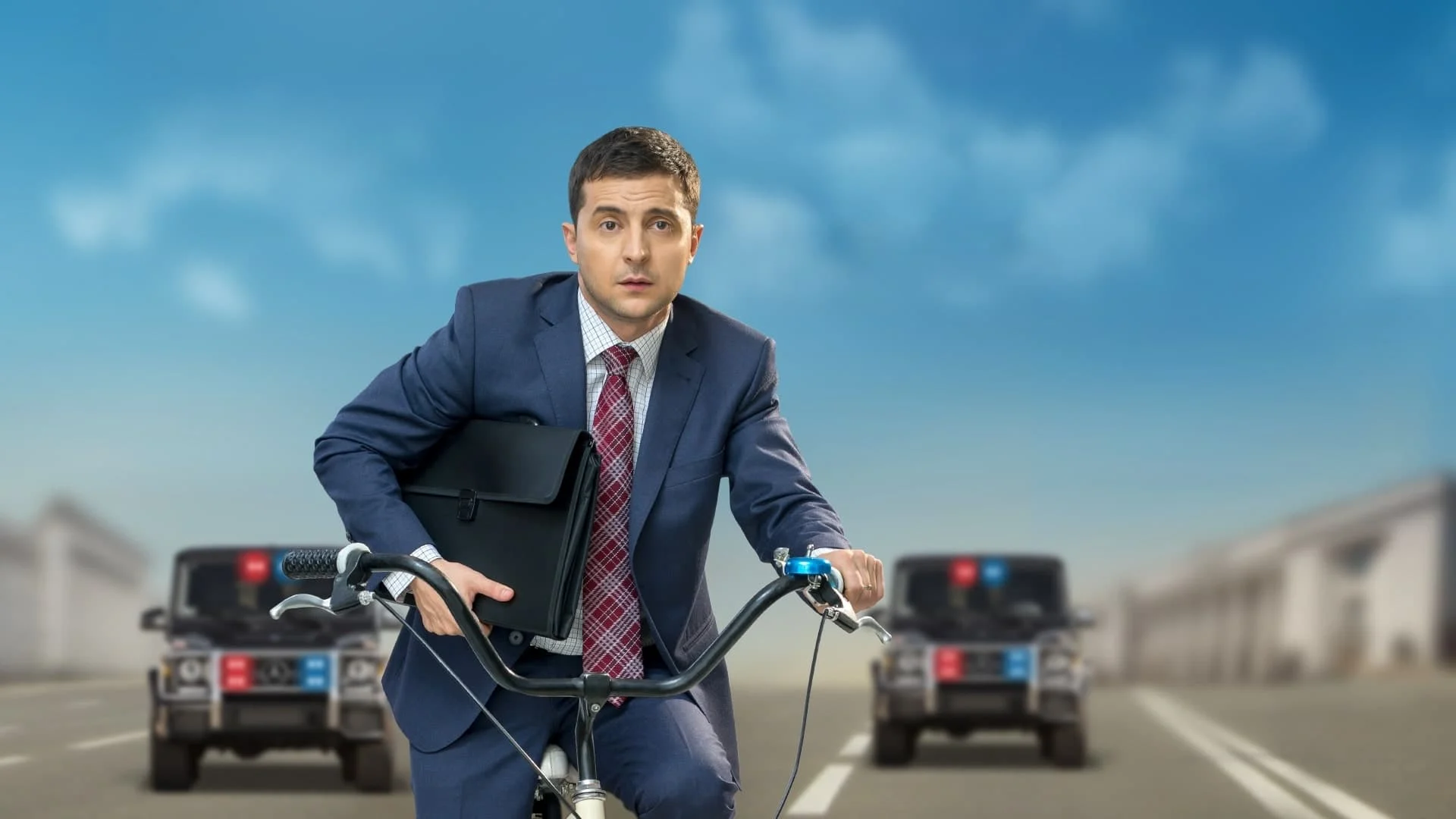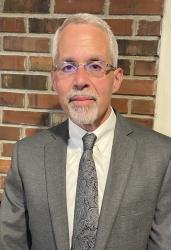Three Ukrainian oligarchs, a shadow Triumvirate as it were, stand on a balcony overlooking a gorgeous town square. An election for president is imminent and they’re tired of wasting millions on backing their own candidates and then millions more on ruining those candidates’ rivals. So they decide that, this time, they’ll refrain from buying a president for Ukraine. They’ll step aside and allow the people to make their own choice for leader. “Unsupervised democracy?” one asks. They see it as a kind of game and experience something of an adrenaline rush.
And so Ukrainians, when given the opportunity to make their will known, select, of all people, Volodymyr Zelensky—or should I say his comic alter ego, Vasyl Petrovych Holoborodko, a “simple teacher from Kiev” as one news reader calls him, in this 2015 Ukrainian sitcom, Servant of the People, now streaming on Netflix.
When we meet him, Vasyl, divorced and living at home with his parents and niece, has two main concerns: getting a shirt ironed so his principal doesn’t fire him during their weekly meeting (which would suit his cabbie of a father just fine, seeing as unemployment pays more than teaching) and getting into the bathroom, currently occupied by said niece. And the bathroom just happens to be where Vasyl is seated when the announcement comes that he has just been elected president of Ukraine.
How? How does a schoolteacher get elected president? On the limousine ride to the capitol he realizes it was all the fault of that video. See, one of his students, recently upbraided by Vasyl for being a smart aleck and a numbskull, captured on his cellphone a profanity-laden rant Vasyl unleashed on a friend when his students are pulled out of class and told to prepare voting booths and posters for the upcoming election—again. Why his history class and not, say, the math class? Because history is undervalued, not treated as a science. “And then we wonder why our politicians make the same mistakes when they enter the halls of power. Because they’re great mathematicians! All they know is to divide and subtract!”
That little observation is just the beginning. “And who is there to vote for? It’s always the lesser of two ass—– and it’s been this way for 25 years!” And so on. The video is uploaded to YouTube (of course) and goes viral, becoming the talk of the school and even, as it turns out, the country. Days later and back in the classroom, his students insist that their parents loved the video and would vote for Vasyl for president instead of the usual suspects.
And the next thing you know, he’s being driven to the capitol. The priorities of State become evident quickly: Hermès, Donna Karen, Ralph Lauren, or Versace cologne? Berluti, Testoni, or Louis Vuitton shoes? Calvin Klein, Jean-Paul Gaultier, Dolce & Gabbana, or Karl Lagerfeld suit? A Patek Phillipe or Vacheron Constantin watch (one of which is favored by Putin, he is told). Photos are snapped, selfies are uploaded to Facebook, a mold of his hand is take for the National Museum, one of his foot for the Soccer Museum, and all this before lunch.
On the way to his first press conference, in which this was all in aid of, Vasyl asks to take care of two urgent personal matters. One requires a stop at the bank so he can make a payment on a loan. Once there he learns, not from his usual teller but from the chairman of the bank himself, that he is the winner of a special, annual lottery draw, and as such has had all his debts written off. The chairman assures him it has nothing to do with Vasyl’s just having been elected president of the nation.
As Mel Brooks would say, it is good to be king.
From the bank Vasyl hurries to his usual Friday meeting with the principal only to be informed by his prime minister, Yuriy Ivanovich Chuiko, that as president there’s never a need to hurry. “You’re not late. You’re delayed.” (Now we know where Biden gets it.) Despite being the most powerful man in the country (at least on paper), Vasyl is still terrified of entering the principal’s office (aren’t we all). He suffers a flashback of the day when he was confronted about the video that would elevate him to the highest office in the land, but in that moment almost certainly was about to get him fired for “doing irreparable damage to the school.” Vasyl defends his rant on the principle that it was, four-or-however-many-letters-in-Ukrainian words aside, “the truth.” In this case, the truth, instead of setting everyone free, has brought the wrath of the Ministry of Education down on the principal’s coiffe and the school must now undergo “re-certification,” which is no doubt the administrative equivalent of a colonoscopy only without a sedative.
But as Vasyl enters the principal’s office now, as the newly elected president of Ukraine, well, the principal greets him not with threats of dismissal but with both a massive cake decorated more like a Christmas wreath than a pastry and her insistence that it was an honor to have had him on the faculty—and if she ever scolded him it was only because she saw such great potential in him. I guess president trumps minister of education when it comes to invasive medical procedures.
Even his usually underimpressed father now sings his son’s praises as he fields phone calls from people he has no recollection of ever meeting but who nevertheless are looking for handouts from the new president in the interest of a friendship that never existed in the first place. Opportunists do not let little things like dignity stand in the way of a sinecure. Although the father has no qualms about handing out deputy minister positions to real friends. “Enough already,” his wife intones. “You’ve already appointed half of Ukraine.”
The perks of the position are quickly beginning to add up. “Get used to it, Vasyl Petrovich,” his handler says. “You’ve been granted an entirely new life. It’s like a second birthday,” which reminds Vasyl that it is, in fact, his niece’s birthday and he needs to buy her a gift. The fact that they are already late for that 1 p.m. press conference does not matter. The president has a pressing need. (That Vasyl may already be putting personal, even if familial, needs ahead of the country’s doesn’t seem to dawn on him. Yet.)
As for that press conference, his first formal introduction to the country at large as their new president, well, his prepared-by-minions responses to complex economic and political questions come across as phony and forced as you’d imagine. But instead of sticking to the script, Vasyl instead apologizes for not being prepared. He promises to do his homework if the press corps will allow him to “retake the questions.” He admits quite frankly that he doesn’t even know “some of the meanings of the terms being used.”
But rather than being beguiled by this sudden burst of honesty, even innocence, one journalist is incensed and insists on knowing where he got the “two million” to register his candidacy for president in the first place. This is the first we’re hearing of a fee to get on the ballot. As it happens, he was never really an accidental candidate. Once that video of his rant burned up the interwebs, the students in his history class egged Vasyl on to register with the Election Board. At first he rejected the idea because a “common person can’t become president,” if for no other reason than it takes 2 million unpronounceable Ukrainian dollar-like thingees to register. “Sure, but you know about crowdfunding, right?” a student pipes up. Which they’ve already taken care of.
The two million is literally in a bag. And Vasyl is a candidate for president of Ukraine.
Those oligarchs who opened the episode? They’ve been watching the press conference on TV while enjoying an exquisite, caviar-saturated meal. “Our country likes cheap populism,” one of them declares. A debate then ensues as to who was really responsible for putting this guy in power. Each assumed it was the other, despite their having decided to let the people have their own way, which only meant letting Ukrainians pick between the two frontrunners, each of whom was already bought and paid for. But this guy came out of nowhere. “A man ascended to the presidency who isn’t under the control of any of us?” Oy vey! “Perhaps he’s a puppet of the West. Or the Kremlin.” Somebody needs to do some investigating.
Even Chuiko, the prime minister, doesn’t believe he came up with the two million from something called “crowdfunding,” which he assumes is just slang for some underhanded scheme. No, “the people” didn’t just come up with the money. “The people” don’t do anything.
In short, no one believes what is in fact the truth: A common man without guile or political experience is now the most powerful person in the country, thanks to a popular assent collated by the internet, the same medium that brings you cats falling off pony walls and Russian disinformation. Can you blame them?
History Stranger Than Fiction
Armando Iannucci, the Italian-Scot writer-director of the political satire The Thick of It and its American counterpart Veep, has made quite the career for himself portraying the political class as a bunch of narcissistic, Peter Principled vulgarians whose concern for the common good is as authentic as a laugh track. Servant of the People isn’t quite in the Iannucci class; it doesn’t produce the guilt-inducing belly laughs (the racism! the misogyny!) and is neither as relentlessly crass or even cynical, although it makes an effort. The problem, if you can call it that, is Zelensky’s character. Vasyl is a recognizable human being—in over his head, sure; naïve and unprepared for the position he’s been given, of course; thrown off-balance, yes. But damn if he doesn’t at least care. His rant against government corruption and the complacency that allows a broken system to stay broken wasn’t for the cameras; it came from the heart and just happened to be caught on camera. And the final scene betrays a playfulness, a sentimentality, that was never to be found in any of Iannucci’s creations.
This was just the pilot episode, and there are three seasons total. (IMDB “Trivia” says: “This is the only known fictional show to end because it came true.” Wiki appears to agree. I mean, try and imagine Robin Williams or Jerry Seinfeld suddenly becoming commander in chief at the end of their respective TV runs, and nailing it. It’s almost as incredible as that Bedtime for Bonzo guy becoming president and overseeing the end of the Cold War.)
I doubt I’ll stick with Servant of the People to the very end of Season 3, but I am curious. Will Vasyl prove to be a president who makes a difference (whatever that means), or will the civil service, that permanent class of fiddlers and obfuscators whose only goal is to serve their own narrow ends, undermine him at every turn, as in the premise (if not always the execution) of Yes Minister? Or will the oligarchs strike back? Will the Kremlin? Will Zelensky, er, Vasyl save his nation from depredation against impossible odds?
I sure as hell hope so.

